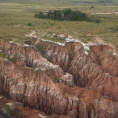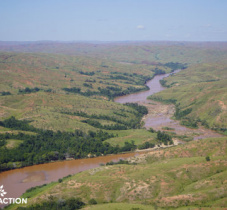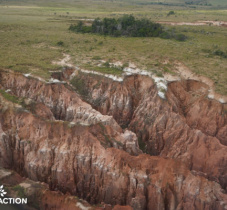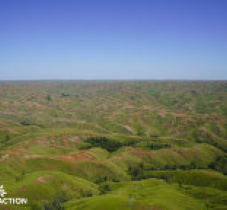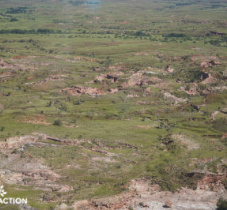Project description
In the heart of the Madagascan forest, Hennessy, Reforest'Action and local partners 2400 Sourires and Siel bleu are pursuing a double objective: to create garden forests to enable local populations to protect their crops and diversify their sources of income; and to raise the awareness of the young generation within local schools.
Overview of the project
Nombre trees to be planted : 200 000 trees
Species planted : acacia, pine, eucalyptus, orange, persimmon, Brazilian cherry...
Plantation period : 2021-2022
Context of the project
In the Analamanga region of Madagascar, the challenge is to restore forest cover to combat global warming and slow down soil degradation.
The island of Madagascar is known for its mountainous terrain, its unique fauna and flora, but also its forests that cover 20% of the territory and are home to a rich biodiversity. Unfortunately, in the recent years, forests have paid a heavy price to human activities. Indeed, deforestation is responsible for the destruction of the island's forest ecosystems, causing soil erosion as well as a dramatic loss of biodiversity.
To counter this phenomenon, preserve natural ecosystems and improve the population’s living conditions, supporting reforestation in Madagascar is a priority. Throughout the project financed by Reforest'Action and supported by the associations 2400 Sourires and Siel Bleu, trees of various species are to be planted in order to revive the forests’ multifonctionality in the Anamalanga region. Trees will be planted near water sources to help the forest resist heat waves and droughts.
Locally, the associations will raise the population’s awareness on the necessity to adopt agricultural practices that are kinder to the environment : a School of the Forest will be implemented to support this transition and transmit agricultural management practices that positively impact the forest.
Project's implementers
Founded in 1999 by Romain and Séverine Lagache, 2400 Sourires supports children in Antananarivo, the Malagasy capital. The organisation focuses on two major areas: child protection and the environment. Faced with the disappearance of 85% of the country’s wooded areas over the last 30 years, the association has been setting up reforestation projects for several years. In partnership with Reforest’Action, the NGO is going to raise the population’s awareness on the issues related to deforestation. It will set up nurseries and carry out various reforestation actions on the region.
The Groupe Associatif Siel Bleu (GASB) is a French association founded in 1997. Since its creation, the members have continued to develop actions for the most vulnerable populations. Every day, Siel Bleu contributes to the improvement of people’s well-being and quality of life.
Actions in the field (2021-2023)
The project, conducted over two planting seasons (2021-2022 and 2022-2023), is based on three interdependent components: reforestation, the Forest School and a mobile awareness unit. To ensure the sustainability of the forests, reforestation activities must be coupled with educational support to raise awareness among local populations of the importance of these forests and the extent of their benefits.
Reforestation
The deployment of the project on the ground started in August 2021. The creation of the nursery, which produced 90,000 seedlings for the reforestation area, was the first phase. The reforestation campaign followed from February to May 2022. This first phase of planting was monitored and the area protected from June of the same year. The species planted were selected according to the needs of the local population:
- Energy wood and drought resistance with acacia, liquidambar and African mahogany;
- Soil structuring with Mantaly, yellow flamboyant and albizia;
- Melliferous properties with jacaranda and pink berry.
This project has been renewed for 2023, and 110,000 plants were planted between January and April 2023.
Training
The Forest School is an important component of the project. Its purpose is to train young generations of farmers in agroforestry techniques, the preservation of agroecosystems and, more broadly, in the technical teaching of sustainable (agro)forestry management. A building is being constructed to house its activities. It will consist of a classroom, practical rooms, an orchard, a nursery and a laboratory. Without waiting for its construction, which has been delayed, the training of 15 students over 9 months began in September 2021, in the nursery intended for the reforestation component. In June 2022, a new year of training was initiated, this time for 20 students, still within the nursery. These students were trained in all the processes involved in the reforestation cycle (from the nursery to planting and monitoring).
The objective of the training is to initiate a change and a sustainable impact on the practices of man in his environment, putting the tree back at the heart of his daily life. Supported by the Ministry of Higher Education, this Forest School provides a certification at the end of the training to give students new opportunities. The project also provides each student with 25 ares (0.25 ha) of land in their home community so that they can put their lessons into practice and sustain their work. The land is allocated to these young people by the local communities in exchange for the Forest School paying the full cost of the training.
Awareness raising
In parallel with the training component, a project to raise awareness among local communities of sustainable practices related to agroforestry has been set up. It takes the form of a mobile unit whose mission is to change the way local people look at trees. Seen today as a resource for firewood or construction wood, the ambition is to show that trees can bring other resources (horticulture, honey or essential oil production, rare wood, etc.).
Because the environmental crisis that has hit Madagascar has concrete effects for the entire population. And there is a real willingness on the part of local people to commit to the protection of reforested areas, with the withdrawal of free grazing of zebus on the sites as a marker. To be successful, these initiatives need to be supported and the communities accompanied towards more sustainable practices.

